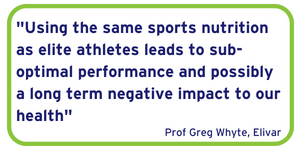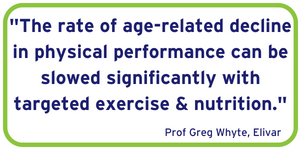How Over 35s Should Use Sports Nutrition - Professor Greg Whyte

In this blog Professor Greg Whyte introduces the science of ageing and how targeted exercise and nutrition is required to reduce the rate of age-related decline in performance. By adopting a ‘healthy lifestyle’ we have the ability to slow the rate of aging (and potentially reverse aging for those that have lived a less than healthy lifestyle!).
Aging is not solely a matter of chronology, it is also intimately associated with biology. As we age our bodies change in response to a host of stimuli (or lack thereof!) leading to a reduction in peak performance. The rate of decline in performance (and health) is, in part, in our own hands and closely linked to changes in behaviour.
In general, a large number physiological changes occur as a result of aging including: a reduction in cardiac output (important for, amongst other things, aerobic capacity); decreased elasticity of lung structures; reduced muscle mass, strength, flexibility and mobility; glucose intolerance; and insulin insensitivity (diabetes in common in the elderly), to name but a few! Combined, these age-related changes lead to a reduction in physical performance that we commonly see starting from a peak in our mid-30’s.
 Several biological ‘theories of aging’ have been proposed which can be summarized into 2 categories. Firstly, the accumulation of damage to informational molecules, and secondly, the regulation of specific genes. In other words, the repair of our cells cannot keep pace with the rate of damage throughout life leading to aging, and/or the role of specific genes is to switch-off or reduce the replication of cells leading to aging.
Several biological ‘theories of aging’ have been proposed which can be summarized into 2 categories. Firstly, the accumulation of damage to informational molecules, and secondly, the regulation of specific genes. In other words, the repair of our cells cannot keep pace with the rate of damage throughout life leading to aging, and/or the role of specific genes is to switch-off or reduce the replication of cells leading to aging.
But, all is not lost! In addition to our genes, our environment (i.e. diet, physical activity etc.) plays a central role in the rate of aging. By adopting a ‘healthy lifestyle’ we have the ability to slow the rate of aging (and potentially reverse aging for those that have lived a less than healthy lifestyle!).
Exercise and diet have a key role to play in aging.
Numerous studies have demonstrated that the rate of the age-related decline in physical performance can be slowed significantly with targeted exercise. For example, strength and power training becomes increasingly important to combat the age-related reduction in muscle mass and strength.
 Targeted nutrition is required to support the changing demands of aging (i.e. quality, quantity and timing of protein ingestion plays a central role in muscle mass and strength for older athletes).
Targeted nutrition is required to support the changing demands of aging (i.e. quality, quantity and timing of protein ingestion plays a central role in muscle mass and strength for older athletes).
As we age it is important that we pay greater attention to our exercise and diet to ensure we optimize our performance. Commonly, master’s athletes adopt the same practices as those of young athletes, to their detriment. The consumption of excessive sugars and inadequate protein combined with a focus on age-inappropriate training programmes are common mistakes made by master’s athletes.
In this series of blogs, along with the team at Elivar, I will be addressing some of the key nutrition areas that should be adapted for the older athlete to ensure optimum performance and health.
OTHER BLOGS BY PROFESSOR GREG WHYTE
How The Over 35's Should Use Complex Carbohydrates - Professor Greg Whyte
About Professor Greg Whyte OBE PhD BSc FBASES FACSM
Physical Activity Expert, World-renowned Sports Scientist & Olympian
- Two-time Olympian
- Professor of Sport Science, Liverpool John Moores University
- Published over 200 peer reviewed papers and 8 books in the area of sport, exercise science and medicine
- Performance Director, Centre for Health and Human Performance
- Chair of UK Active Research Institute Scientific Advisory Board
- Helped to raise over £35 million for Comic Relief and Sport Relief
- Author of Amazon Bestseller: Achieve the Impossible
- Principal investigator for WADA
Also in News

A Huge Thank You - A Message From Donal & Len
We are writing to let you know that today marks the beginning of our FINAL SALE at Elivar.
Since our founding in 2012, we’ve been driven by the belief that there’s a healthier way to approach sports nutrition for everyday athletes—those of us who exercise as part of a balanced, healthy lifestyle.
We created award-winning products that provided energy without the sugar rush typical of mainstream brands. Our unique blends were designed to support post-exercise recovery, especially as our bodies changed over time.

Elivar's Sustain Go! Energy Gels Fuelling BigFeat Events' Success
BigFeat Events, recognized for orchestrating captivating endurance events, stands out for its dynamic blend of cycling and running sportives. The recent "Beast to the East" cycling sportive, held on May 21st, is a sterling example of their commitment to crafting exhilarating experiences. A cornerstone of the success and popularity of these events has been the provision of Sustain Go! energy gels, generously sponsored by Elivar.
Previous running and events such as the "Bigwayround Trail Run" and "BigSea Trail Run" also benefited from the free distribution of Sustain Go! energy gels, much to the participants' delight. The energy boost and quicker recovery offered by these gels have consistently been instrumental in empowering athletes to perform their best.

NMN: Boosting Your Health from the Kitchen to the Medicine Cabinet
Did you know that Nicotinamide Mononucleotide (NMN), the star ingredient in numerous anti-aging supplements, also moonlights in several foods you might already enjoy? It's true! NMN is a vital precursor to NAD+, a molecule crucial to many biological processes, like cell growth, DNA repair, and metabolism. But as we age, NAD+ levels take a hit, and bolstering them through NMN intake can be beneficial. Now the question arises, can we simply count on our daily meals for our NMN fix?
